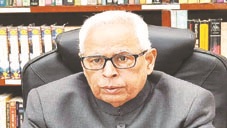news details |
|
|
| Vohra teaching JK's elected leaders a sumptuous lesson | | Governance is not about power and luxuries | |  Early Times Report Early Times Report
Jammu, June 27: Governor NN Vohra is once again giving sleepless nights to the earlier rulers of the state whom people chose during elections in the past. He is virtually exposing their lethargic attitude and is teaching them how the governance is done and belief of the common masses is strengthened in the institution of governance in the state.
The Governor is sending out a clear message to the democratically elected politicians that government is not about power at all and nor it means enjoying luxurious lifestyle at the expense of the state exchequer.
Immediately after receiving President of India's approval, Vohra issued the Proclamation to impose Governor's Rule in the State under section 92 of the Constitution of Jammu and Kashmir on June 20.
On the very first day, Vohra took the decisions that the previous government of PDP and BJP were reluctant to take without any reason.
He ordered finalisation of recruitment rules, directed the departments to take immediate measures for the regularisation of more than 60 thousand daily wagers who were waiting for the confirmation of their services.
On day 2, June 21, the dead anti-graft bodies in the state begun to act against the corrupt. The State Vigilance Organisation that earlier was in inactive all of a sudden came in news, with its spokesman claiming that its has booked two officials from Doda district of the state for graft-related charges.
A senior official of the state dispensation who was part of the meeting that was chaired by the Vohra on June 20 said that the Governor emphasised that the cases pertaining to the day to issues of the masses piling up in government offices must be resolved without any further delay.
On January 7, 2016, PDP founder and then Chief Minister Mufti Mohammad Sayeed breathed his last in AIIMS, New Delhi. What followed his death was the deadlock over the formation of government. Late Mufti's daughter Mehbooba Mufti was reluctant to assume office of CM, wanting the government of India to take more Confidence Building Measurers. She finally took oath as JK's first woman CM on April 4, 2016. During the intervening period of three months, Governor's rule was imposed and what the elected governments couldn't do for years in the past, Vohra and his team did that in mere two months. Dredging of river Jhelum, Industrial Policy, Advertisement Policy, Implementation of Drug Policy, Termination of 100 doctors who had gone outside to practice without any permission, additional two kilos of rice under National Food Security Act for every household, deadline set for vacation of army land at Tattoo Ground and High Ground Anantnag, biometric attendance through Adhaar for all state government employees were the decisions which otherwise were ought to be taken by democratically elected governments.
The dredging of Jhelum that had become inevitable after the devastating floods of September 2014 was also delayed. Tenders weren't even invited for the past 10 months despite the fact that Kashmir always remains on a brink of flood like situation. It was finally the Governor who initiated and ordered the work.
Succour to the 2014 flood victims was kept hanging in air for months together. Thousands of the flood victims were denied any relief from the government earlier. Again it was Governor who walked the extra mile and ordered disbursement of the relief.
The introduction of the biometric attendance was another measure that Vohra took at a time when JK employees were known for fudging their duty hours. The survey conducted at that time revealed that the revolution in the work culture was witnessed by the imposition of the governor's rule in the state and that the entire administration was on the tenterhooks to mitigate peoples' sufferings at large. The survey showed that the average 'in-time' of the staff was being recorded at 9.28 am and the average 'out-time' of the staff was recorded at 5.46 pm.
Survey's findings revealed further that the employees no longer were being found fudging their duty hours and that the offices that used to witness attendance of the employees not before 11 a.m witnessed employees discharging their respective duties at 10.15 a.m on an average.
The survey that was conducted in the Civil Secretariat Jammu too revealed that 31.6 percent of the staff showed up before the office start time of 9 am while, 38.8 per cent of the registered employees marked their presence between 9 am and 10 am. |
|
|
|
|
|
|
|
|
|
|
|
|
| |
| |
|
|
|
|
 |
|
|
|
|
STOCK UPDATE |
|
|
 |
| BSE
Sensex |
 |
| NSE
Nifty |
|
|
| |
CRICKET UPDATE |
|
|
|
|
|
| |
| |
|
|
| |
|
|
|
|
| |
|
|
|
|
|
|
|
|
|
|
|
|
|
